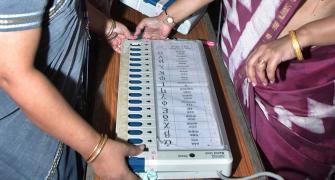Ajay Singh aims his cellphone at a shy bride-to-be and clicks: within seconds, her digital photograph pops up on a prospective groom's mobile telephone miles away.
"Earlier, we used to rely on sending photographs through the post. Now, marriages are arranged much faster because we can send pictures of brides and grooms on cellphones," said Singh, a matchmaker in New Delhi.
A cellphone isn't just a rich man's fashion accessory in India. It's transforming the way millions of people do business in a country where even land lines were a luxury barely a decade ago. Fishermen negotiate prices for their catch while still at sea and tradesmen use them to do business.
"My business has increased by at least 25 per cent since I acquired a cellphone. Earlier I lost a lot of business because I was always on sites," said Rajesh Kanojia, an electrician in Delhi. "Now, customers can get in touch with me at all times."
Barely nine years after cellphones were launched, the South Asian nation already has nearly 14 million users, and the number is expected to leap to 100 million by 2008, industry estimates show.
"Across the country people with low incomes are now adopting cellular phones as tools for enhancing their business," said Sunil Mittal, Chairman of Bharti Tele-Ventures Ltd, India's largest cellular services provider and 16 per cent owned by Singapore Telecommunications.
That's great news for the country's dozen-plus mobile phone service providers and global handset makers such as Nokia, which has a dominant share of the market.
Mobile services revenues are already $1.4 billion a year, and mobile phone makers are racking up $1 billion in annual sales. Analysts forecast strong growth ahead, as just five in 100 people currently own a phone.
The number of cell phone users in India is a fraction of China's 226 million, but analysts say the nation will be one of the biggest markets for telecom companies. Rock-bottom call rates -- as little as 0.4 rupees per minute for mobile-to-mobile calls -- are driving the growth.
Fashion accessory
The mobile phone craze is not limited to businessmen and traders. Saffron-clad holy men carry them. Teenagers are wild about them.
"Some people carry handsets as fashion accessories. Sometimes, they even have five handsets so they can carry different phones to match their clothes on different days," said Pankaj Mohindroo, president of the Indian Cellular Association.
Walk into a coffee bar and you'll find twenty-somethings fixing dates on their cells and furiously SMS-ing flirtatious limericks, dirty jokes or the latest cricket scores.
Ring tones based on the latest Bollywood blockbusters are a rage and diehard users create their own signature tunes.
"I love funky phones, especially with coloured screens," says Bhanav Kharbanda, 21, who sends nearly 15 to 20
Indians exchange between six and seven million messages each day, according to industry estimates.
Digital pictures are flying across the country. More than 1,700 pictures were sent on just one cellular network during a Rolling Stones concert in Mumbai in April, newsmagazine India Today said.
"The youth market is the one that is open to experimentation and trying out new services and handset technologies," said Kobita Desai, an analyst at research firm Gartner.
Takeoff
India has come a long way from the late 1980s, when barely one in 10 homes in cities had a land line and public phones were few.
People used the phone at the neighbourhood grocery store or drove miles to a post office for long-distance calls.
Ever since the country threw open its economy in the early 1990s, the telecom sector has grown at a scorching pace and the mobile phone market has boomed.
The sector has attracted a host of global giants including handset makers such as Motorola and Nokia as well as equipment providers like Lucent Technologies and Alcatel.
And more than a dozen cellular services firms including the Indian unit of Hong Kong's Hutchison Whampoa conglomerate and unlisted state-run giant Bharat Sanchar Nigam Ltd are fighting for a slice of the growing pie.
"The Indian mobile market has been growing tremendously and we firmly believe that it is in the takeoff stage," said Narendra Nayak, Motorola's country manager for the personal communications sector. "We're now talking about a million new additions a month."
Growth market
Mobile services revenues are expected to grow at a compounded annual growth rate of 35 per cent for the next five years from 2002's base of $1.4 billion, Gartner says.
Bharti recently posted its first-ever quarterly profit as revenues surged 134 per cent to 10.39 billion rupees, the most in the industry.
The company also is the biggest player by subscribers with 24 per cent market share, followed by government-run BSNL, which controls about a fifth of the pie.
Most handset makers expect sales to grow around 70 per cent annually over the next two years, especially with the growing popularity of limited mobility services.
Mohindroo is even more bullish: He forecasts sales of 9.5 million mobile phones this year, compared with last year's 4.4 million, and expects annual sales of 60 million handsets in 2008.
Youngsters will fuel the growth.
"I always forward a funny joke to my father on his phone," said Arushi Kumar, a 10-year-old from Delhi. "And the games are the best part."







